On September 24, while playing pickleball, about 15 minutes after the match started, Mr. Binh ( Hanoi ) experienced severe chest pain, pain spreading to the neck, difficulty breathing, and profuse sweating.
MSc. Dr. Nguyen Hoai Vu, Department of Cardiology, Tam Anh General Hospital, Hanoi, said the patient was brought from the sports field to the hospital in a state of typical angina. The electrocardiogram recorded an acute ST-elevation myocardial infarction. Percutaneous coronary angiography showed a blood clot completely blocking the coronary artery.
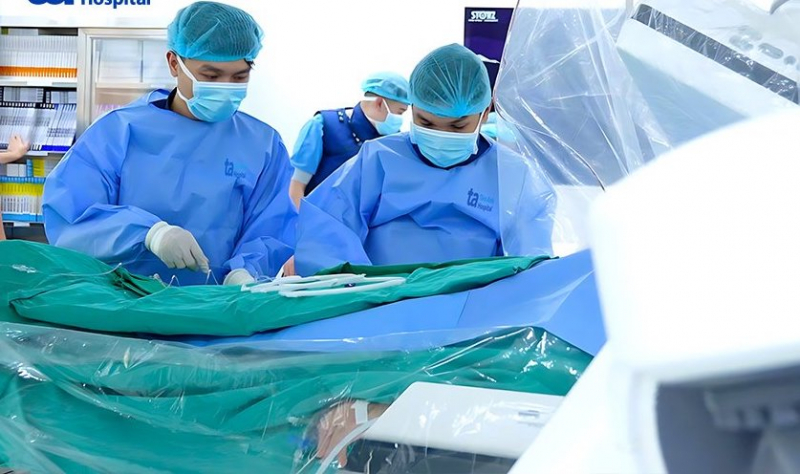
Taking a medical history, Mr. Binh had a history of smoking for many years, causing the atherosclerosis process to occur silently, but the patient did not detect it to have appropriate treatment. In the coronary artery, there was an unstable atherosclerotic plaque - a "fragile" type of plaque containing a lot of cholesterol, with a thin fibrous shell. When exercising vigorously, specifically playing pickleball, this atherosclerotic plaque cracked, forming a thrombus (blood clot) that blocked the coronary artery and caused an acute myocardial infarction.
Immediately, Mr. Binh was transferred to the intervention room. The team performed a stent placement in the right coronary artery under intravascular ultrasound guidance.
From the time of admission to the Emergency Department until the balloon angioplasty was injected to restore blood flow, the team took less than 30 minutes, significantly shortening the American Heart Association's recommended threshold of less than 90 minutes. Timely myocardial reperfusion helps reduce the risk of complications and preserve heart function.
The intervention was successful, Mr. Binh escaped the danger, his chest pain was gone, his heart function was maintained with EF reaching 55%. After 1 week of monitoring, his health was stable, and the male patient was discharged from the hospital.
According to the doctor, after returning home, Mr. Binh needs to continue taking his medication regularly as prescribed, exercise gently and gradually increase the intensity, but should not rush back to high-intensity competitive sports like pickleball until his cardiovascular condition is stable.
Dr. Vu said that Mr. Binh, at only 42 years old, had a heart attack, which is quite young. About 60-70% of acute heart attacks originate from unstable lipid plaques. People with many cardiovascular risk factors such as smoking, dyslipidemia, diabetes, obesity, lack of exercise, etc. are highly likely to form this type of fragile plaque.
However, it is not possible to determine with certainty who has unstable lipid plaques without examination using modern imaging techniques such as new-generation coronary CT angiography, intravascular ultrasound, or intravascular optical coherence tomography.
Dr. Vu recommends that maintaining a healthy lifestyle, eating a balanced diet, limiting saturated fat and refined sugar; exercising regularly at a moderate level, suitable for your physical condition, avoiding sudden exertion; controlling weight and especially absolutely not smoking... can help significantly reduce the risk of myocardial infarction.
Pickleball games are fast-paced and require agility and flexibility in many directions. These sudden accelerations and changes in direction can cause the heart to work at high intensity in a short period of time, which is a factor that can cause arrhythmia or myocardial ischemia, especially in middle-aged and elderly people with underlying diseases.
Therefore, with high intensity sports such as pickleball, soccer, tennis..., people with underlying cardiovascular disease and cardiovascular risk need to be assessed before participating.
Tobacco contains many toxins for the human body such as nicotine, formaldehyde, cyanide... Smokers have a high risk of cardiovascular disease, stroke, dental disease and even cancer.
Smokers increase the concentration of oxidation products such as oxidized LDL cholesterol and reduce the concentration of HDL cholesterol - a factor that plays a role in protecting the heart. These factors combine with the effects of CO and nicotine to damage the endothelium. Because of the above damage processes, the body of smokers will increase vascular reactions, reduce the supply of oxygen-carrying blood, leading to myocardial ischemia and coronary spasm.
Source: https://cand.com.vn/Xa-hoi/nhoi-mau-co-tim-khi-dang-choi-pickleball-sau-nhieu-nam-hut-thuoc-la-i784783/


![[Photo] Many dykes in Bac Ninh were eroded after the circulation of storm No. 11](https://vphoto.vietnam.vn/thumb/1200x675/vietnam/resource/IMAGE/2025/10/15/1760537802647_1-7384-jpg.webp)



![[Photo] General Secretary To Lam attends the 18th Hanoi Party Congress, term 2025-2030](https://vphoto.vietnam.vn/thumb/1200x675/vietnam/resource/IMAGE/2025/10/16/1760581023342_cover-0367-jpg.webp)
![[Photo] Conference of the Government Party Committee Standing Committee and the National Assembly Party Committee Standing Committee on the 10th Session, 15th National Assembly](https://vphoto.vietnam.vn/thumb/1200x675/vietnam/resource/IMAGE/2025/10/15/1760543205375_dsc-7128-jpg.webp)
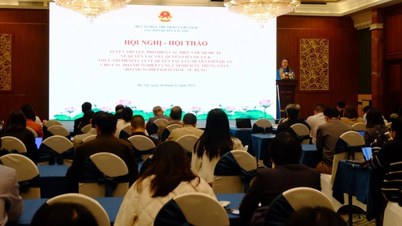

















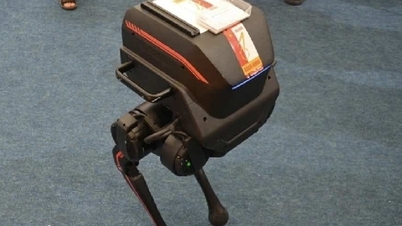


![[Video] TripAdvisor honors many famous attractions of Ninh Binh](https://vphoto.vietnam.vn/thumb/402x226/vietnam/resource/IMAGE/2025/10/16/1760574721908_vinh-danh-ninh-binh-7368-jpg.webp)































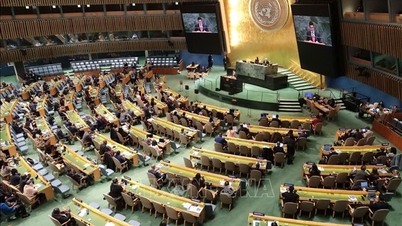




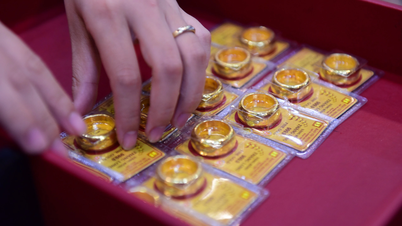
































Comment (0)